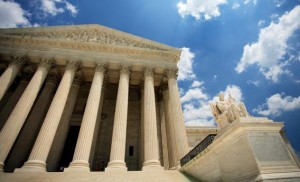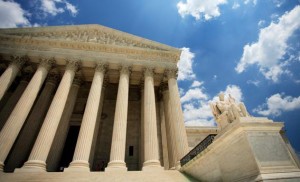 UPDATE: HERE IS THE AUDIO OF TODAY’S ARGUMENT
UPDATE: HERE IS THE AUDIO OF TODAY’S ARGUMENT
HERE IS THE TRANSCRIPT OF TODAY’S ARGUMENT
I am going to do something different today and put up a post for semi-live coverage – and discussion – of the DOMA oral arguments in the Supreme Court this morning. First, a brief intro, and then I will try to throw tidbits in here and there as I see it during and after the arguments.
The case at bar is styled United States v. Windsor, et al. In a nutshell, Edith Windsor was married to Thea Spyer, and their marriage was recognized under New York law. Ms. Spyer passed away in 2009 and Windsor was assessed $363,000.00 in inheritance taxes because the federal government, i.e. the IRS, did not recognize her marriage to Spyer in light of the Defense of Marriage Act, or DOMA. Litigation ensued and the 2nd Circuit, in an opinion written by Chief Judge Dennis Jacobs, struck down DOMA as unconstitutional and ruled in favor of Edith Windsor. Other significant cases in Circuit Courts of Appeal hang in the lurch of abeyance awaiting the Supreme Court decision in Windsor, including Golinski v. Office of Personnel Management, Gill v. OPM and Pedersen v. Office of Personnel Management.
As an aside, here is a fantastic look at the restaurant where Edith Windsor and Thea Spyer met nearly 50 years ago.
Arguing the case will be Solicitor General Donald B. Verrilli again for the United States, Paul Clement for the Bi-Partisan Legal Advisory Group (BLAG) on putative behalf of Congress, because the Obama Administration ceased defending DOMA on the grounds it was discriminatory and unconstitutional, and Robbie Kaplan for Edith Windsor. Clement and Verrilli are well known by now, but for some background on Robbie Kaplan, who is making her first appearance before the Supremes, here is a very nice article. Also arguing will be Harvard Law Professor Vicki Jackson who was “invited” by SCOTUS to argue on the standing and jurisdiction issue, specifically to argue that there is no standing and/or jurisdiction, because the Obama Administration quit defending and BLAG will argue in favor of standing and jurisdiction.
Here is a brief synopsis of the argument order and timing put together by Ed Whelan at National Review Note: I include Whelan here only for the schedule info, I do not necessarily agree with his framing of the issues).
Okay, that is it for now, we shall see how this goes!
Live Updates:
10:39 am It appears oral arguments are underway after two decisions in other cases were announced.
10:51 am RT @SCOTUSblog: #doma jurisdiction arg continues with no clear indication of whether majority believes #scotus has the power to decide case.
11:00 am By the way, the excellent SCOTUSBlog won a peabody award for its coverage of the Supreme Court.
11:05 am @reuters wire: 7:56:34 AM RTRS – U.S. SUPREME COURT CONSERVATIVE JUSTICES SAY TROUBLED BY OBAMA REFUSAL TO DEFEND MARRIAGE LAW
11:15 am Wall Street Journal is reporting: Chief Justice John Roberts told attrorney Sri Srinivasan, the principal deputy solicitor general, that the government’s actions were “unprecedented.” To agree with a lower court ruling finding DOMA unconstitutional but yet seeking the Supreme Court to weigh in while it enforces the law is “has never been done before,” he said.
11:20 am Is anybody reading this, or is this a waste?
11:32 am @SCOTUSblog Kennedy asks two questions doubting #doma validity but nothing decisive and Chief Justice and Kagan have yet to speak.
11:40 am Wall Street Journal (Evan Perez) Chief Justice Roberts repeatedly expressed irritation at the Obama administration, telling Ms. Jackson, the court-appointed lawyer, and without specifically mentioning the administration, that perhaps the government should have the “courage” to execute the law based on the constitutionality rather instead of shifting the responsibility to the Supreme Court to make a decision.
11:45 am Wall Street Journal (Evan Perez) Paul Clement, attorney for lawmakers defending the law, argued that the went to the very heart of Congress’s prerogatives. Passing laws and having them defended was the “single most important” function of Congress, he argued.
11:52 am Wall Street Journal (Evan Perez) Justice Scalia and Mr. Srinivasan parried on whether Congress should have any expectation that laws it passes should be defended by the Justice Department. Mr. Srinivasan said he wouldn’t give an “algorithm” that explained when Justice lawyers would or wouldn’t defend a statute, but ceded to Justice Scalia’s suggestion that Congress has no “assurance” that when it passes a law it will be defended. That’s not what the OLC opinion guiding the Justice Department’s actions in these cases says, Justice Scalia interjected.
11:56 am Associated Press (Brent Kendall) One of the last questions on the standing issue came from Justice Samuel Alito, who asked whether the House could step in to defend DOMA without the Senate’s participation, given that it takes both chambers to pass a law.
11:59 am Bloomberg News During initial arguments today on the 1996 Defense of Marriage Act, Justice Anthony Kennedy suggested that a federal law that doesn’t recognize gay marriages that are legal in some states can create conflicts.
“You are at real risk of running in conflict” with the “essence” of state powers, Kennedy said. Still, he also said there was “quite a bit” to the argument by backers of the law that the federal government at times needs to use its own definition of marriage, such as in income tax cases.
Justice Ruth Bader Ginsburg said that when a marriage under state law isn’t recognized by the federal government, “One might well ask, what kind of marriage is this?”
12:05 pm @SCOTUSblog Final update: #scotus 80% likely to strike down #doma. J Kennedy suggests it violates states’ rights; 4 other Justices see as gay rights.
12:07 pm The argument at the Court is well into the merits portion of the case now
12:09 pm Wall Street Journal (Brent Kendall) Justice Kennedy, however, jumped in with federalism concerns, questioning whether the federal government was intruding on the states’ territory. With there being so many different federal laws, the federal government is intertwined with citizens’ day-to-day lives, he said. Because of this, DOMA runs the risk of running into conflict with the states’ role in defining marriage, he said.
12:12 pm It is pretty clear to me, from a variety of sources I am tracking, that the Court has serious problems with DOMA on the merits. Clement is getting pounded with questions on discrimination, conflict with state laws and federalism concerns. Pretty clear that if standing is found, DOMA is going down.
12:15 pm Wall Street Journal (Brent Kendall) Justice Ginsburg again says the denial of federal benefits to same-sex couples pervades every area of life. DOMA, she said, diminished same-sex marriages to “skim-milk” marriages. Justice Elena Kagan (pictured) follows a short time later saying DOMA did things the federal government hadn’t done before, and she said the law raised red flags.
12:19 pm @reuters wire: U.S. SUPREME COURT CONCLUDES ORAL ARGUMENTS ON FEDERAL LAW RESTRICTING SAME-SEX BENEFITS
12:30 pm @AdamSerwer Con Justices contemptuous of Obama decision not to defend DOMA but still enforce law. Kennedy said “it gives you intellectual whiplash”
Okay, as I said earlier, if the Justices can get by the standing issue, it seems clear that DOMA is cooked. I think they will get by standing and enter a decision finding DOMA unconstitutional as to Section 3, which is the specific part of the law under attack in Windsor. That effectively guts all of DOMA.
That is it for the “Live Coverage” portion of the festivities today. It should be about an hour and a half until the audio and transcript are available. As soon as they are, I will add them as an update at the top of the post, and will then put this post on the top of the blog for most of the rest of the day for further discussion. It has been bot a fascinating and frustrating two days of critical oral argument; please continue to analyze and discuss!
 Love will find a way, and it finally has. There are many, many friends I am thinking of right now, and they all know exactly who they are. Congratulations, and it was far too long coming. Here is the opinion.
Love will find a way, and it finally has. There are many, many friends I am thinking of right now, and they all know exactly who they are. Congratulations, and it was far too long coming. Here is the opinion.




